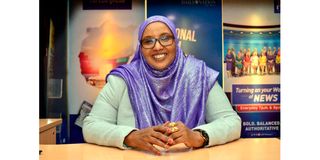Unity of purpose key to bridging gender gap in political seats

More women are daring to challenge the heavy patriarchal barriers in leadership. In the 2017 election, Sophia Abdi Noor (pictured) made history as the first female elected as Ijara MP.
What you need to know:
- Next year’s election will be significant, complicated and competitive given that the incumbent will be leaving office.
- This participation, from the electoral process (already in motion), remains the key weapon to build the numbers and safeguard women’s place in the country’s governance.
This year’s Women Rights Convention was a moment to cherish.
Hosted last month by the Community Advocacy and Awareness Trust (Crawn Trust), the two-day women’s rights forum dubbed Kenyan Women Rising, was as inspirational as it was informative and exciting. The diversity of speakers - women representing various generations, all speaking with one voice, was motivating and exceptional.
Although the focus was on what gender imbalance means - with women on the receiving end as they continue to be socially and politically marginalised, and disempowered by a patriarchal society- the discussions around the power dynamics were constructive, progressive and took a positive tone.
By the end of day two, it was clear women’s voices would not be drowned nor silenced. This triggered the hope that women and by extension the movement’s leadership, is ready and committed to take the lead in the struggle for a more equal, just and democratic society.
Coming exactly a year to the General Election, the anticipation generated by the renewed commitment is timely. Next year’s election will be significant, complicated and competitive given that the incumbent will be leaving office. Its unpredictability as a result of the Covid-19 pandemic notwithstanding, it is an election that women should actively participate in, as aspirants and voters. This participation, from the electoral process (already in motion), remains the key weapon to build the numbers and safeguard women’s place in the country’s governance.
Current gains
From the candid conversations at the convention, I discerned an urgent and honest desire to not only safeguard the current gains but to also achieve more, especially through the political process and participation.
It is this unity in diversity that should also include men who share in this school of thought, and support for one another that will guarantee women more seats not only in the most competitive ones such as the single constituencies for the National Assembly and governorship but also make in-roads into the usually problematic and ‘exclusive’ male terrain particularly within conservative communities.
This position was adeptly delivered by Prof Margaret Kobia, the Gender Affairs Cabinet Secretary. She expressed disappointment over gender imbalance, but on the other hand affirmed the positive progress and need to focus on driving the change.
If the feelers and political development from areas perceived for years as conservative are anything to go by, it is likely that women will make political breakthrough by getting elected to seats that have been perceived a preserve for men.
Uphill task
In Narok, for instance, a county that is largely conservative and patriarchal, the Woman Representative Roselinda Soipan, is widely believed to be among those aspiring for the governorship seat next year.
This is a gigantic and most welcome progress by Ms Soipan who is serving her second straight term as Narok County MP- and which without a doubt, will be an uphill but worthy task, given the conservative nature of the county’s majority constituents.
A year to the General Election, at least four people have expressed interest in the seat currently held by Governor Samuel Tunai who is serving his final term. But Ms Soipan, who holds a Master’s degree in Law, will be banking on her consistency and talent as a leader as she eye’s the county’s top seat.
It is, however, expected that the usual hurdles and barriers historically placed in women’s paths to political leadership, will be squarely positioned her way - and more-given her political landscape. Hers then, will need to be among the top in the list of priorities where campaigners for gender equality and equity and women in particular, will need to throw their support behind her candidacy.
Political ambition
More vigilance, preparedness and awareness will be most essential during nominations by the political parties - typically the killer stage for most women’s political ambitions.
In the same county, Agnes Pareiyo, a veteran women’s rights campaigner who lost her bid for the Narok North Constituency seat in 2017, appear to not have given up.
These, and other women aspirants for political seats mainly from challenging environment, will need unwavering support to get rid of the obstacles in their way to political leadership.
Doing so will hopefully help increase the number of women in elected positions. The good news is that with more women daring to challenge the status quo, the heavy patriarchal barriers will be shattered. It happened in the 2017 elections in Ijara Constituency. The MP, Sophia Abdi Noor made history as the first female elected to the seat.
Ms Rugene, a former Parliamentary Editor at the Nation, is founder, The Woman’s Newsroom Foundation.





